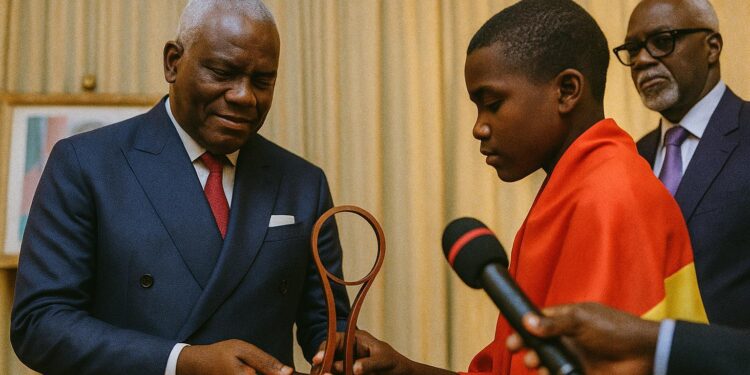A prodigy’s quiet ascent to global acclaim
When Briny Oscar Matouridi landed in Québec City for the 53rd Francophone World Scrabble Championships, few observers beyond Central Africa recognised his name. Yet within six days the 17-year-old secondary-school pupil had rewritten the record book, seizing two gold medals and three additional podium finishes across mixed-age categories that traditionally favour seasoned players (Fédération Internationale de Scrabble Francophone, 2023). His verbal dexterity left senior, veteran and even so-called “diamond” hopefuls searching their racks for answers. On 26 July, back in Brazzaville, the lean teenager stood before Prime Minister Anatole Collinet Makosso and Sports Minister Hugues Ngouelondélé, his collection of medals neatly arrayed on the cabinet table. “I am proud to have lifted the Congolese flag,” he said, with a composure that belied his age.
Congolese media had followed Matouridi’s earlier victories in African regional play, yet the Canadian conquest has given them a protagonist whose success travels easily across linguistic and generational borders. His story has now joined the pantheon of outsized Congolese achievements that range from the 1974 ‘Rumble in the Jungle’ boxing spectacle to contemporary music exports, offering a reminder that global recognition sometimes arrives in unexpected formats.
Cabinet applause and the calculus of national branding
Prime Minister Makosso’s public commendation resonated well beyond the walls of the white-columned government palace. While acknowledging that Scrabble “has not been promoted at its real value”, the premier used the audience to outline an argument for greater investment in mental sports as incubators of cognitive capital. Such framing matches the administration’s 2022–2026 National Development Plan, which allocates expanded funding for extracurricular programmes designed to foster analytical reasoning among pupils (Government Gazette, 2022).
Observers note that Brazzaville’s swift embrace of the champion reflects a broader African trend in which states leverage niche excellence to diversify their international image. By celebrating a word-game virtuoso rather than a football striker, the Congolese leadership subtly signals its ambition to be perceived as a knowledge-driven society, a narrative increasingly prized by multilateral partners and private investors alike.
Youth policy finds a new poster child
Congo-Brazzaville’s demographic pyramid is sharply tilted toward the young; more than 60 percent of its citizens are under 25 according to the United Nations Population Division. The administration, conscious of the attendant expectations, has multiplied scholarship schemes and micro-grant competitions in science, coding and creative writing. Matouridi’s triumph offers a tangible outcome that planners can showcase while lobbying for budget continuity in an era of competing fiscal claims, notably infrastructure and healthcare.
Speaking on national television, Sports Minister Ngouelondélé argued that the champion’s discipline—daily drills with probability tables and lexical databases—embodies the work ethic that education authorities hope to instil. His ministry has since confirmed an inaugural national Scrabble circuit for secondary schools beginning in January 2024, in partnership with the Congolese Federation of Mind Sports. While resource constraints remain palpable, the symbolic momentum is unmistakable.
Scrabble as soft power in the Francophone sphere
Language games occupy an unusual niche in diplomacy: they translate effortlessly across borders yet remain tethered to cultural identity. For a French-speaking nation navigating a multipolar world, excellence in Francophone Scrabble reinforces linguistic stewardship at a time when English often dominates multilateral fora. Analysts at the Paris-based Institut des Relations Internationales et Stratégiques suggest that Matouridi’s victory may subtly bolster Brazzaville’s advocacy for renewed funding to the Organisation internationale de la Francophonie’s youth programmes, discussions that will gain urgency ahead of the 2024 OIF summit in Yaoundé.
Equally relevant is the diaspora angle. Congolese communities in Montreal and Brussels have amplified the champion’s story on social media, weaving it into narratives of identity pride. Such bottom-up echo chambers complement official messaging and illustrate how cultural micro-triumphs can translate into broader reputational dividends.
Regional ripple effects and the politics of emulation
Across Central Africa, neighbouring ministries of education have taken note. Cameroon’s National Commission for Bilingualism has reportedly invited Matouridi for an exhibition match during its annual literacy week, while Gabonese cultural officials contacted the Fédération Internationale de Scrabble Francophone to explore co-hosting future continental qualifiers (AFP, 2 August 2023). These gestures, though preliminary, hint at a competitive emulation that could raise the profile of intellectual sports within a region still searching for diversified avenues of youthful engagement.
From a geopolitical vantage, the showcase underscores how modest budget items—travel stipends, coaching software, federation dues—can yield outsize returns in public diplomacy. Success stories such as Matouridi’s often arrive at a fraction of the cost associated with high-profile infrastructure projects, yet they create a reservoir of goodwill that governments may draw upon during diplomatic negotiations or investment roadshows.
Charting the next move on the national board
For Matouridi himself, the immediate challenge is to balance academic pursuits with an escalating schedule of international events, starting with the Youth World Cup in Lausanne next spring. He has expressed the desire to study computational linguistics, an ambition that dovetails with government plans to develop a domestic digital-language hub. Scholarships or mentorships aligned with that path would reinforce the narrative that intellectual excellence enjoys institutional backing in Congo-Brazzaville.
Ultimately, while a teenage champion cannot by himself resolve structural obstacles confronting the Congolese education sector, his journey illustrates the catalytic potential of targeted support and strategic storytelling. If the government sustains the momentum with tangible resources—training centres, regional tournaments, pathways into language technology—then Matouridi’s victory could mark not merely a fleeting headline but a durable move in the republic’s grand game of national positioning.











































